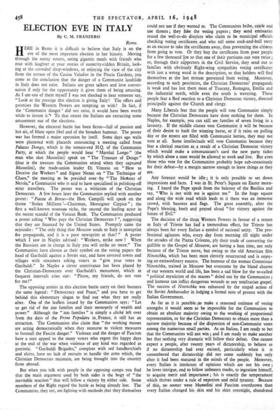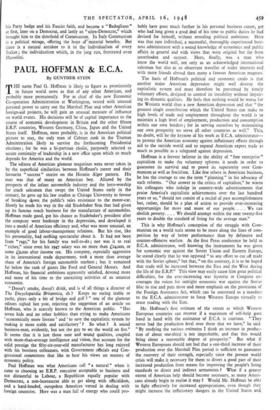ELECTION EVE IN ITALY
By C. M. FRANZERO Rome. HERE in Rome it is difficult to believe that Italy is on the eve of the most important election in her history. Moving through the sunny streets, eating gigantic meals with friends who roar with laughter at your stories of austerity-ridden Britain, look- ing at the crowded shop-windows, or enjoying the view of the city from the terrace of the Casina Valadier in the Pincio Gardens, you come to the conclusion that the danger of a Communist landslide in Italy does not exist. Italians are great talkers and love conver- sation if only for the opportunity it gives them of being amusing. As I am one of them myself I was not shocked to hear someone say, " Look at the prestige this election is giving Italy! The offers and promises the Western Powers are tempting us with! In fact, if the ' Communist danger' did not exist, it would have been worth while to invent it.'; To that extent the Italians are extracting some amusement out of the elections.
However, the electoral battle has been fierce—full of passion and hot air, of blunt open libel and of the broadest humour. The poster war has formed a major operation by itself. Some days ago walls were plastered with placards announcing a meeting called from Palazzo Dongo, which is the tomato-red H.Q. of the Communist Party, at which the people would hear " Marshal Longo" (the man who shot Mussolini) speak on " The Treasure of Dongo " (that is the treasure the Communists seized when they captured Mussolini), the trade-union leader Di Vittorio on " How to Deceive the Workers " and Signor Nenni on " The Technique of Chaos," the meeting to be presided over by " The Monster of Nerola," a Communist who is said to have specialised in polishing-off stray travellers. The poster was a witticism of the Christian Democrats. A few hours later the Communists replied with another poster: "Piazza di Borse.—the Hon. Campilli will speak on the theme ' Stolen Millions '—Chairman, Monsignor Cippice " ; the first a well-known nouveau riche, the second the leading actor in the recent scandal of the Vatican Bank. The Communists produced a poster asking " Who pays the Christian Democrats ? ", suggesting that they are financed by the United States. Promptly came the rejoinder : " The only thing that Moscow sends to Italy is newsprint for propaganda, and it is a poor newsprint at that! " A poster which I saw in Naples advised : " Workers, strike now ! When the Russians are in charge in Italy you will strike no more." The Communists have chosen as their symbol on the voting papers the head of Garibaldi against a Soviet star, and have covered towns and villages with streamers asking voters to " give your votes to Garibaldi." In Naples a clever contrivance has been placed by the Christian-Democrats over Garibaldi's monument, which at frequent intervals cries out: " Please, my friends, do not vote for me!"
The opposing armies in this election battle carry on their banners the same legend: " Democracy and Peace," and you have to get behind this elementary slogan to fmd out what they are really after. One of the leaflets issued by the Communists says: " Let us get rid of the 200 families and their monopoly of wealth and power." Although the " zoo families " is simply a cliché left over from the days of the Front Populaire in France, it still has an attraction. The Communists also claim that " the working masses are acting democratically when they recourse to violent measures to forestall the Fascist danger." Violence and the danger of Fascism have a sure appeal to the many voters who regret the happy days at the end of the war when violence of any kind was regarded as patriotic. "Garibaldi Brigades," complete with red handkerchiefs and shirts, have no lack of recruits to handle the arms which, the Christian Democrats maintain, are being brought into the country from abroad.
But when you talk with people in the opposing camps you find that the main argument used by both sides is the bogy of " the inevitable reaction" that will follow a victory by either side. Some members of the Right regard the battle as being already lost. The Communists, they say, are fighting with methods that they themselves could not use if they wanted to. The Communists bribe, cajole and use threats ; they fake the voting papers ; they send emissaries round the well-to-do districts who claim to be municipal officials checking voting certificates and who tell some cock-and-bull story as an excuse to take the certificates away, thus preventing the citizens from going to vote. Or they buy the certificates from poor people for a few thousand lire so that one of their partisans can vote twice ; or, through their supporters in the Civil Service, they send out to families with obviously Right-wing sympathies voting certificates with just a wrong word in the description, so that holders will find themselves at the last minute prevented from voting. Moreover, according to such pessimists, the Christian Democrats' propaganda is weak and has lost them most of Tuscany, Romagna, Emilia and the industrial north, while even the south is wavering. These people fear a Red reaction to a Christian Democrat victory, directed principally against the Church and clergy.
Many Liberals fear that the people will vote Communist simply because the Christian Democrats have done nothing for them. In Naples, for example, you can still see families of seven living in a lavatory. If the middle classes vote Communist it will be because of their desire to back the winning horse, or if it rains on polling day or the streets are filled with Communist lorries, they may not vote at all. Some intellectuals will vote Communist because they fear a clerical reaction as a result of a Christian Democrat victory which would make a communicant's card the new party ticket by which alone a man would be allowed to work and live. But even those who vote for the Communists probably hope sub-consciously for their defeat—by a margin narrow enough to leave things as they are.
Any forecast would be idle ; it is only possible to set down impressions and facts. I was in St. Peter's Square on Easter morn- ing. I heard the Pope speak from the balcony of the Basilica and say, " Who is not with me is against me." In the huge square and along the wide road which leads to it there was an immense crowd, with banners and flags. The great assembly, after the Pope's blessing, knelt and prayed aloud " for victory against the forces of Evil."
The decision of the three, Western Powers in favour of a return to Italy of Trieste has had a tremendous effect, for Trieste has always been for every Italian a symbol of national unity. The pro- fessional agitators who, every day from morning till night under the arcades of the Piazza Colonna, ply their trade of converting the gullible to the Gospel of Moscow, are having a lean time, not only because of the Trieste move, but owing to the old American film Ninotchka, which has been most cleverly resurrected and is enjoy- ing an extraordinary success. The humour of the woman Commissar Ninotchka, trained in Moscow but overcome by the bland charms of our western world and life, has been a sad blow for the so-called "political mysticism of the masses " doled out by the Communists ; and humour can inflict dangerous wounds to any totalitarian gospel. The success of Ninotchka was enhanced by the stupid action of the Soviet Ambassador in lodging a formal note of protest with the Italian Government.
As far as it is possible ,to make a reasoned estimate of voting strengths it would seem to be impossible for the Communists to obtain an absolute majority owing to the working of proportional representation, or for the Christian Democrats to obtain more than a narrow majority because of the dispersion of non-Communist votes among the numerous small parties. As an Italian, I am ready to bet that the Communists will not win ; and I am ready to make another bet that nothing very dramatic will follow their defeat. One cannot expect a people, after twenty years of dictatorship, to behave as if no dictatorship had ever existed, particularly when it is remembered that dictatorship did not come suddenly but only after it had been matured in the minds of the people. Moreover, every Italian is intolerant of opinions which are not his own ; he loves intrigue, and to follow unbeaten tracks, to ingratiate himself, to acquire merit and importance ; his is exactly the temperament which thrives under a rule of nepotism and mild tyranny. Because of this, no sooner were Mussolini and Fascism overthrown than every Italian changed his skin and his shirt overnight, abandoned his Party badge and his Fascist faith, and became a "Badog,liano " at first, later on a Democrat, and lastly an "ultra-Democrat," which brought him to the threshold of Communisni. In Italy Communism is a political mirage, offering the hope ormaterial benefits. But there is a natural antidote to it in the individualism of every Italian ; the individualism which, in the long run, frustrated even Mussolini.































 Previous page
Previous page